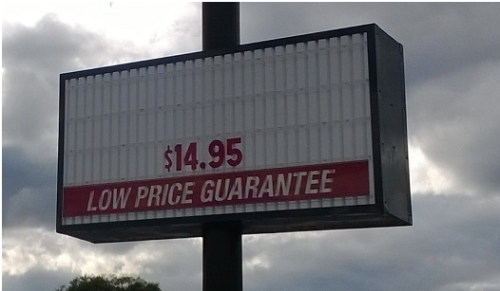How often do we see businesses small and large making the claim that they offer “the best value in town”?
And why is it that people assume that such a statement means that “best value” is the lowest price?
In the strictest sense, value has nothing to do with price.
A $100 bill is valued at $100 no matter how many hours you worked to get it.
On the other hand, an icy cool glass of lemonade is more valuable to a man mowing the lawn in the summer than one sitting on a bus stop in the middle of winter, even if it costs $2 in both cases.
Being the “low price leader” doesn’t (necessarily) mean your customers are getting the best value; it just means they’re paying less than they are anywhere else.
That usually makes you the lowest paid provider in your field.
I don’t know about you, but that’s not a position I’m in a hurry to occupy.
Avoid Price Wars at Any Cost
Price is not the true battlefield – or if nothing else, it’s not the one you want to fight on.
As a fun illustration, I’d like to point you to the legendary Elwood City snow shoveling war between Arthur Read and Buster Bunny.
The entire video is enjoyable, but the business-related part really starts about five minutes in, with key takeaways at about 7:20 and 8:20.
~ “He’d be crazy to compete with me at this price.”
~ “You won’t make any money that way.”
You might put a hurting on the other guy, but you’ll probably cause irreparable damage to your own business in the process, just like Arthur and Buster did.
Your customers will get used to your bottom-basement pricing and your willingness to undercut the competition.
And even if you put the other guy out of business, what happens when a new competitor comes on the scene? It’s a perpetual race for the bottom.
What’s the Alternative?
The temptation to set your prices low is strong.
You constantly hear about people shopping at Walmart because they’re cheaper than pretty much every other store. Everyone seems to be running discount sales.
Besides, you might be thinking, what’s so special about product? There are half a dozen other vendors in my zip code alone doing the same thing as me. What’s unique about shoveling snow? Plumbing? Accounting?
Consider starting here:
1) Make bolder promises – and back them up. Most of your competitors advertise like cowards. They’re too scared to make big promises. They would rather “under-promise and over-deliver,” which is marketing suicide these days.
What’s the biggest promise you can honestly make? Wrap that up with a dominant emotion your audience is feeling and/or a powerful (true) story and shout it from the rooftops.
The gutsy promise “30 minutes or it’s free” put Domino’s on the map, even though there’s nothing special or particularly valuable about their pizza.
Never promise more than you can deliver, but don’t shoot yourself in the foot by under-promising either.
2) Develop a secret sauce. Even in a commoditized field, like plumbing or snow shoveling, there’s no reason you have to play by the rules everyone else abides by.
What’s stopping you from going the extra mile to provide an outstanding, memorable customer experience?
Ask your customers, or listen to other people talk about your field. What do they hate most?
What do they wish would happen that never does?
As a plumber, wouldn’t a butt-crack free guarantee be a welcome distinction?
Add on-time service and the promise to clean up all the mess before you leave, and you’ve got a major competitive advantage. People will pay more for that.
Babiators, a company that sells sunglasses for children offers the following, remarkable guarantee:
As a father of four rambunctious kids, this is the sort of promise that captures my attention and makes me feel stupid for wasting my money anyplace else.
3) Work on your Unique Value Relationship. It’s really difficult to reduce relationships down to dollar amounts. Haven’t we all paid more to buy from someone we like or admire?
Haven’t we all decided to support businesses we know, even if the cost was a little higher?
When you treat you customers like people, not walking wallets, you have the potential to build relationships that remove price from the equation completely.
When they know, like and trust you, you win. When they identify themselves with your product, service or brand, when they see themselves as part of your tribe, paying less to work with outsiders isn’t even an option.
Just ask the next person you see with an iPhone 5.
—–
Be sure to check out the follow-up to this article, The Wife-Approved Pricing Strategy.


